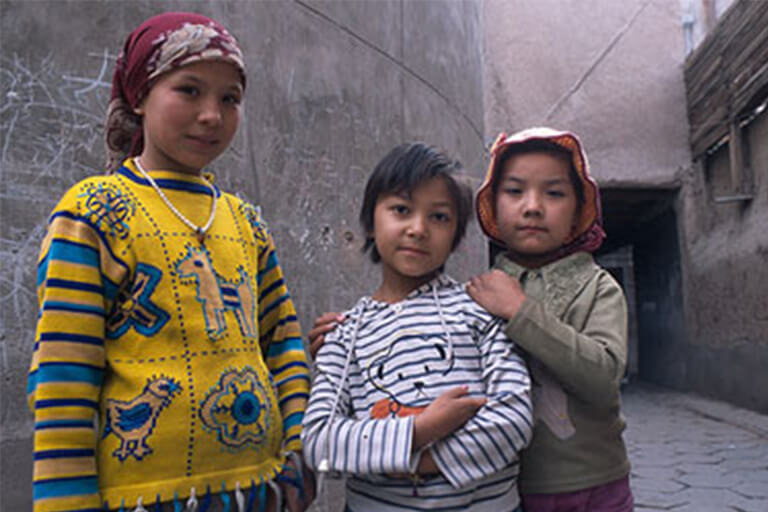Muslim Voices — Islam China

Audio transcript:
0:00:06:>>MANAF BASHIR: Welcome to Muslim Voices. I'm your host Manaf Bashir. There are Muslim populations all over the world in Africa and North America, as well as the Middle East. Some though might be surprised to learn there is a large population of Muslims living in China. Descendants of an empire of their own right, the Uighur became part of China after being conquered by the Chinese in the late 1800's. Today, the majority of the Uighur in China live in the northwest province of Xing Xiang where they are the largest ethnic group. Dr Gardner Bovingdon them is an assistant professor at Indiana University's Department of censor of the Iranian Studies, and is an expert on the Uighur, as well as the area of China where they live. Muslim Voices Rosemary Pennington spoke with Bovingdon about the Uighur and their place in a communist China.
0:01:00:>>GARDNER BOVINGDON: Uighur's are, first and foremost, a substantial population in Shenyang Uighur autonomous region in the northwest corner of China. There are about 9.5 million of them according to the most recent Chinese statistics. Although, whether that's an accurate number is a subject to question. They are Turkic speaking, that is to say their language is entirely different from Chinese - and they are Muslims, which is to say their religion is very different from the well-known religions of China proper.
0:01:31:>>ROSEMARY PENNINGTON : Can the Uighur really practice their faith in China?
0:01:36:>>GARDNER BOVINGDON: It's an excellent question. And the answer depends on who you're talking to and what you mean by practice their faith. The Chinese Constitution guarantees the right to free religious belief, which is further glossed as the right to believe or not to believe. But there is no explicit protection of the right to practice. So the government itself reserves the right to decree - to define what is legitimate practice and what is illegal religious practice, and has for years cracked down on what it interprets as illegal religious practice. Adult Uighur - people over 18 - are allowed to go to mosque and to pray as long as they do it in officially recognised mosques. They don't do it privately, they don't do it in unrecognized locations. People under 18 are not allowed to go to mosques. And adults who are members of the party - and it appears in some places - people who work for the government or even who work for state-owned enterprises are not allowed to participate in religious activities. So there are some restrictions.
0:02:44:>>MANAF BASHIR: Every time I have been telling people I was going to be interviewing you about the Uighur, the reaction is always I had no idea there were Muslims in China. Why do you think that? And I had no idea, really, until I had spoken to you a few times. Why is it that, you know, we hear about Tibet and we hear about other Muslim populations in other places? Why haven't we heard much about the Uighur? I think there are a couple of reasons. First of all, I think a lot of people who don't know that much about contemporary social realities in Asia assume wrongly that the Asian countries are quite homogeneous. Right. That Japan being an island is 100% Japanese. They don't know about the new or various other populations. And similarly, many, many people when they hear China, just think a land of Chinese. There's 1.3 billion people and they all look like, they all speak alike and so forth. There are over 100 million members of the Chinese population who are officially designated ethnic minorities - ethno-national minorities I have to say. And of those, some 20 million are Muslim. Now, half of that number are the so-called Chinese-speaking Muslims who you would have trouble distinguishing visually from other Chinese. But then almost all of the remaining 10 million, as already suggested, are Uighur's who look different, speak differently and so forth. They predominate and therefore are mostly found in this region, which a lot of people didn't used to travel to. They don't have much of an international presence. And you mentioned the Tibetans. I think one important issue here is that Tibetans - by virtue of being Buddhist and by having a charismatic internationally known figure at their head - have a kind of visibility that Uighur's don't by virtue of lacking such a leader and by virtue of being Muslim in a period when it's not a very popular thing to be a Muslim in much of the non-Muslim world.
0:04:36:>>MANAF BASHIR: IU's Gardner Bovingdon talking about the leader. In addition to China, there are also weaker populations in Central Eurasian countries, as well as Germany, Turkey and the United States. This has been Muslim Voices, a production of voices and visions in partnership with WFIU public media from Indiana University. Support for Muslim Voices comes from the Social Science Research Council. You can subscribe to our podcast and items or join the discussion on our website. Find us online MuslimVoices.org.


 IU Global
IU Global